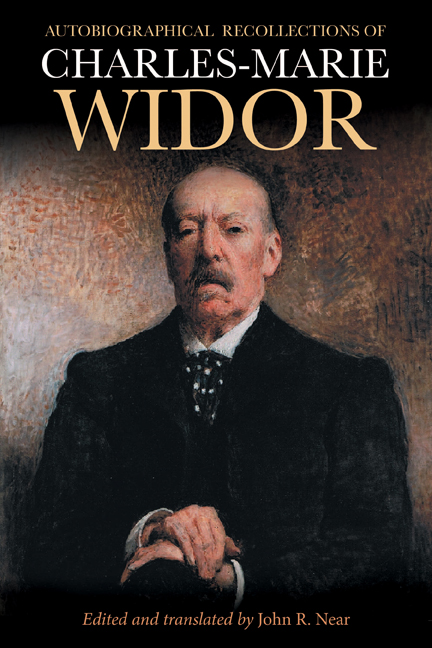Book contents
- Frontmatter
- Contents
- List of Illustrations
- Foreword
- Preface
- Acknowledgments
- Introduction: Tribute to Charles-Marie Widor
- Part One Studies, Early Performances, and Aristide Cavaillé-Coll (1844–69)
- Part Two La Belle Époque: The Franco-Prussian War to The Great War (1870–1914)
- Part Three The Great War and Important Initiatives (1914–37)
- Appendix 1 Birth record of Charles-Marie Widor, 1844
- Appendix 2 Widor’s Diplôme de Bachelier ès Lettres, 1863
- Appendix 3 Widor’s letter of appreciation to Jacques Lemmens, 1863
- Appendix 4 Brussels Ducal Palace organ specification, 1861
- Appendix 5 Widor’s certificate for Chevalier de l’Ordre du Christ, 1866
- Appendix 6 “To Budapest,” 1893
- Appendix 7 Widor’s travels to Russia and his 1903 passport
- Appendix 8 Widor’s list of his works in 1894
- Appendix 9 The Paris Conservatory organs, 1872
- Appendix 10 Chronique [Widor’s appeal for an organ hall at the Paris Conservatory, 1895]
- Appendix 11 Widor’s certificate for the Académie Royale, Brussels, 1908
- Appendix 12 “Debussy & Rodin,” 1927
- Appendix 13 The American Conservatory organ, Fontainebleau, 1925
- Appendix 14 Letters concerning the Trocadéro organ restoration, 1926
- Notes
- Bibliography
- Index
- Eastman Studies in Music
16 - 1878–80: Symphony no. 6 for Organ; Psaume 112; La Nuit de Walpurgis
Published online by Cambridge University Press: 09 May 2024
- Frontmatter
- Contents
- List of Illustrations
- Foreword
- Preface
- Acknowledgments
- Introduction: Tribute to Charles-Marie Widor
- Part One Studies, Early Performances, and Aristide Cavaillé-Coll (1844–69)
- Part Two La Belle Époque: The Franco-Prussian War to The Great War (1870–1914)
- Part Three The Great War and Important Initiatives (1914–37)
- Appendix 1 Birth record of Charles-Marie Widor, 1844
- Appendix 2 Widor’s Diplôme de Bachelier ès Lettres, 1863
- Appendix 3 Widor’s letter of appreciation to Jacques Lemmens, 1863
- Appendix 4 Brussels Ducal Palace organ specification, 1861
- Appendix 5 Widor’s certificate for Chevalier de l’Ordre du Christ, 1866
- Appendix 6 “To Budapest,” 1893
- Appendix 7 Widor’s travels to Russia and his 1903 passport
- Appendix 8 Widor’s list of his works in 1894
- Appendix 9 The Paris Conservatory organs, 1872
- Appendix 10 Chronique [Widor’s appeal for an organ hall at the Paris Conservatory, 1895]
- Appendix 11 Widor’s certificate for the Académie Royale, Brussels, 1908
- Appendix 12 “Debussy & Rodin,” 1927
- Appendix 13 The American Conservatory organ, Fontainebleau, 1925
- Appendix 14 Letters concerning the Trocadéro organ restoration, 1926
- Notes
- Bibliography
- Index
- Eastman Studies in Music
Summary
At this time, 1878, I finished my Symphony no. 6 in G Minor for Organ [op. 42, no. 2], and I played it for Lemmens, as he was passing through Paris, while introducing him to an organ he did not know. Lemmens approved of my symphony, as did François-Auguste Gevaert who accompanied him. At the end, he [Lemmens] leaned over to Cavaillé-Coll and said: “Widor is becoming a serious artist!”
On the occasion of the inauguration of the organ at Saint-François-Xavier, I composed my Psaume 112, for Organ, Orchestra, and Choirs. I have not yet, however, judged it fit to publish.
By chance, the music critic of the Times [London] was present, and he wrote so highly of it in his review that the London Philharmonic asked me to compose an orchestral work that would deal with a somewhat fantastic subject, for example from Goethe's Faust, proposing three movements: a violent piece, a sort of ride; a somewhat lunar, melancholy piece; a bacchanal. I was naturally interested in this work, and I composed La Nuit de Walpurgis (Walpurgis Night) [op. 60, 1880/revised 1888]. At that time, my cousin Paul Bourget had just published in the Revue des Jeunes Poètes two hundred extremely poetic verses on the appearance of Hélène to Faust. Instead of choosing the German subject, I preferred the ancient subject treated by a Frenchman, so I took the following verses from part two as a theme:
Il était à ses pieds, couché sans plus rien dire;
Elle aussi se taisait. Ils écoutaient bruire
Tous les soupirs d’amour lointains et palpitants
Qui flottent dans la paix d’une nuit de printemps.
He was at her feet, reclining, saying nothing more;
She too was silent. They listened to the murmur of
All the distant throbbing sighs of love
That float in the peace of a spring night.
(Paul Bourget, Apparition d’Hélène à Faust)
Consequently, I went to London to direct the performances, and I admit that the work was very well received. The premiere took place at the Queen's Hall.
- Type
- Chapter
- Information
- Publisher: Boydell & BrewerPrint publication year: 2024

